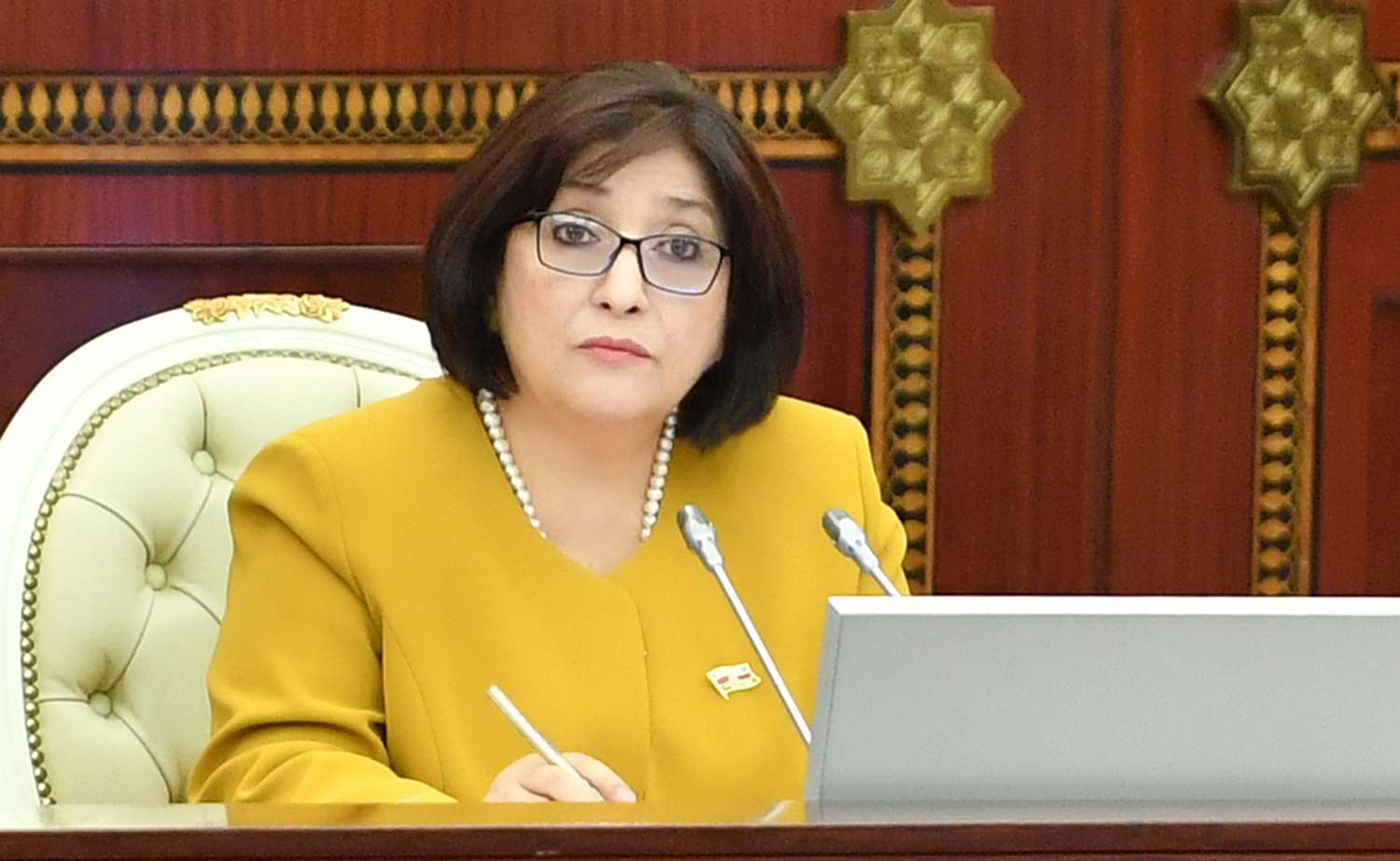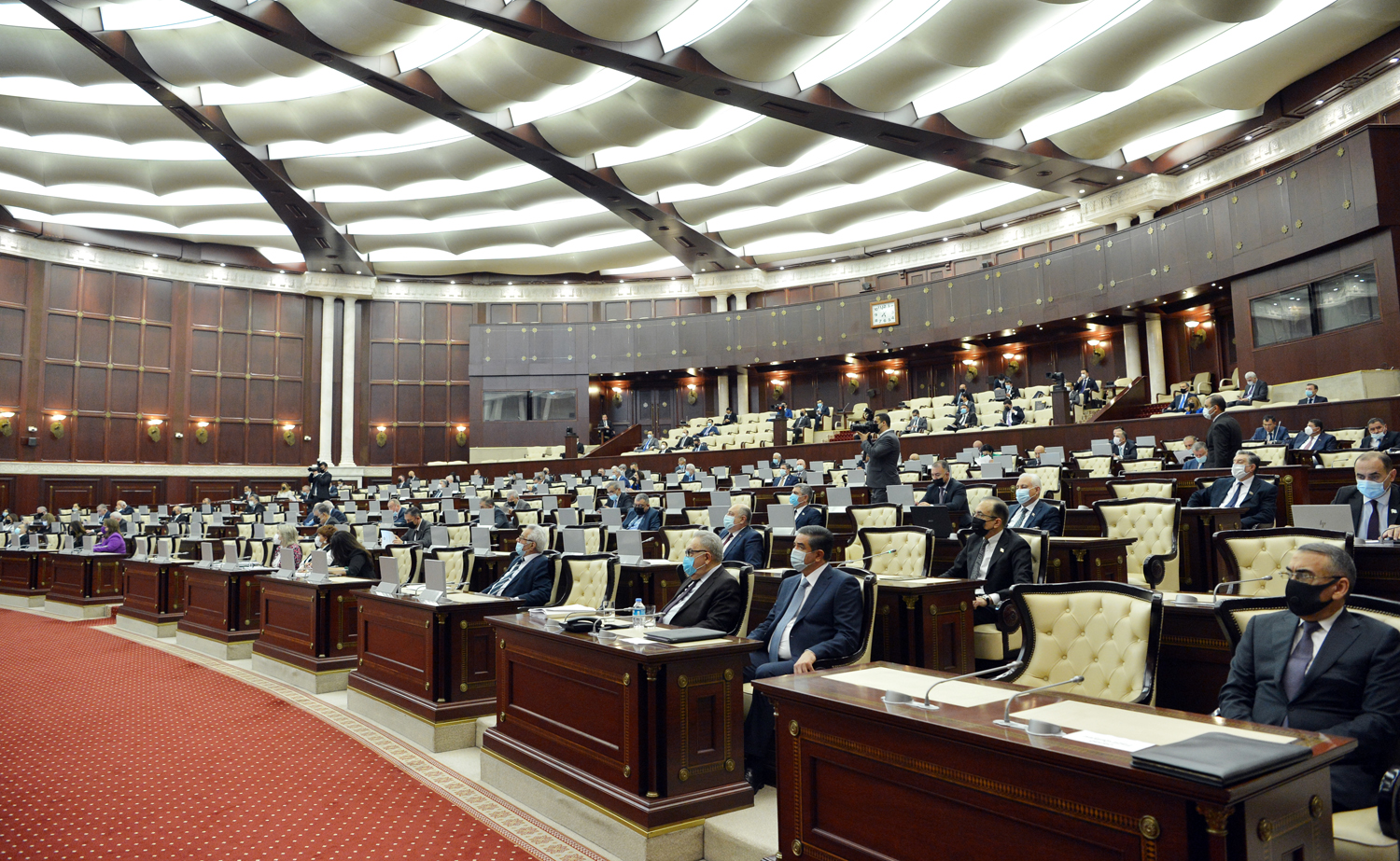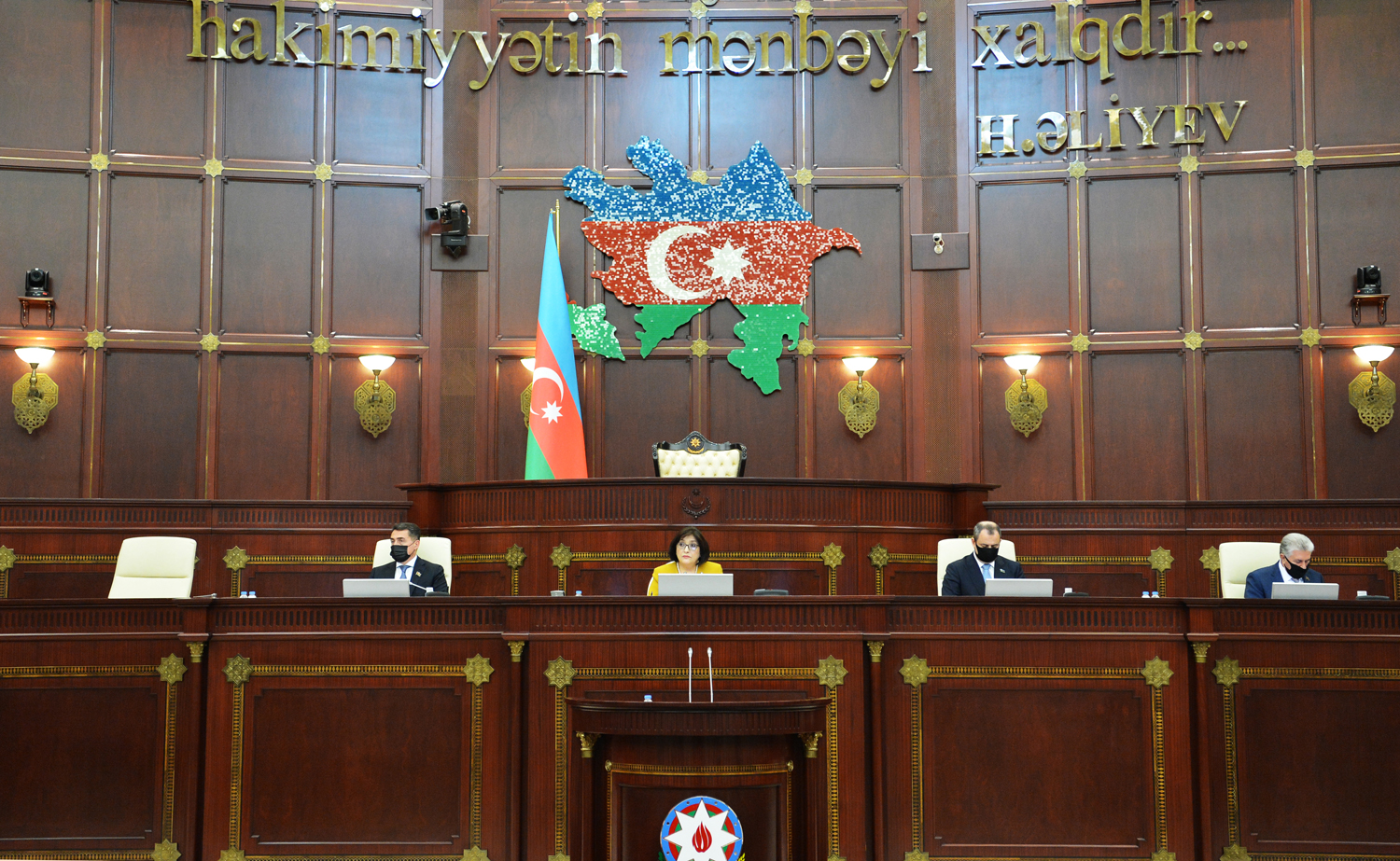The Presentation by the National Co-ordinator on Combatting Human Trafficking was Heard at a Milli Majlis Sitting

Chairman of the Milli Majlis Sahiba Gafarova presided over the ordinary plenary sitting of the Parliament that was held on the 23rd of April.
Adoption of the agenda of the sitting was followed by the discussion revolving about the issues du jour, with remarks and suggestions regarding the electors’ concerns offered by the parliamentary committee chairmen Musa Guliyev and Zahid Oruj as well as the MPs Fazil Mustafa, Nurlan Hasanov, Hikmat Mammadov, Javid Osmanov, Ali Masimli, Bahrouz Maharramov, Jala Aliyeva and Elman Nasirov.
Chair Sahiba Gafarova then announced that there were 18 items on the agenda of the sitting.
The first item was the report by the National Co-ordinator on Combatting Human Trafficking on the relevant work done in the country. Copies of the document were distributed amongst the MPs while the report itself had already been looked at during the joint meeting of the Milli Majlis committees for human rights, and for law policy and state-building.
First Deputy Minister of Internal Affairs Seyfulla Azimov made the presentation by the National Co-ordinator on Combatting Human Trafficking then.
Mr Azimov told the House about the legislative measures adopted to discourage human trafficking, the enlightenment and the preventive arrangements, education events and training courses, international co-operation, the efforts to prevent forced labour, criminal prosecution activities and the care taken of crime victims. He also presented the statistical data descriptive of the results of the action against trafficking in humans.
Seyfulla Azimov remarked whilst talking about the relevant enlightenment action that the internal affairs authorities had conducted more than 350 meetings, assemblies and conferences about the human trade at secondary vocational schools and universities before the pandemic-related social isolation arrangements began to fall into place on 14 March 2020. As regards the period of the pandemic, enlightenment efforts were continued but shifted to the remote realm during it. All that shows the systematic nature of the combat waged against human trafficking in this country, Mr Azimov concluded.
It was mentioned then that the investigation and intelligence work conducted in 2020 revealed 155 human trafficking facts in 16 criminal cases, 5 forced labour facts in 2 criminal cases and 40 unlawful documentation manipulations for the trafficking purposes. The overall crime detection rates reached 98% in human trafficking and 100% in forced labour cases. As many as 20 persons (17 women and 3 men) were put to trial for trafficking. Of the 15 defendants who were found guilty and incriminated in the end, 12 were sentenced to custodial coercion, 2 had conditional sentences passed on them and the penalty of 1 person is on hold pending that person’s child reaching the age fourteen. Of the 94 human trade victims identified in 2020, 93 were Azerbaijani nationals and 1 was a foreigner. They were supplied with adequate aid including the one-off allowances of AZN 700 per capita. Their children, too, were in the focus.
According to the Deputy Minister, it is indicated in the latest UN report that there are 13 human trafficking victims per 100,000 people; in Azerbaijan, meanwhile, it is 1 per 100,000 people. Naturally, that and other achievements are consequent to the successful implementation of the stalwart state measures to improve the social welfare of the population.
Seyfulla Azimov thanked the members of the Milli Majlis for their fruitful co-operation in the legislative field towards the end of his speech.
Chairman of the Milli Majlis Human Rights Committee Zahid Oruj voiced his attitude to the presentation on combatting the trafficking in humans in the Azerbaijan Republic by the National Co-ordinator. Mr Oruj told the assembly that the combat in the republic had taken on a more systematic nature with the ratification of the UN Convention against Transnational Organised Crime by Azerbaijan in 2003: the appropriate national working mechanisms had been formed and the task-specific Main Department had been incepted at the Ministry of Internal Affairs with the First Deputy Minister for Internal Affairs having been appointed as the National Co-ordinator. The relevant National Action Plans had been carried out; this work continues now as well.
The Committee Chairman underlined the innovations introduced to the process this year and shared his ideas about the pertaining international experience.
Deliberations followed, during which commentaries on the presentation came from the parliamentary committee chairs Musa Guliyev, Hijran Huseynova, Siyavush Novruzov and Tahir Rzayev as well as the MPs Aghiya Nakhchivanli, Fazil Mustafa, Elman Nasirov, Etibar Aliyev, Azer Badamov, Gudrat Hasanguliyev, Sahib Aliyev, Sabir Rustamkhanli, Arzu Naghiyev and Nizami Safarov. They made some remarks and suggestions, too.
First Deputy Minister of Internal Affairs Seyfulla Azimov responded to several comments, after which the presentation by the National Co-ordinator on Combatting Human Trafficking of the relevant work done in the country was put on vote and noted duly.
The presentation by First Deputy Chair of the Milli Majlis and Chairman of the parliamentary Committee for Law Policy and State-Building Ali Huseynli was heard next. The draft amendments to the Code of Administrative Offences that made the second agenda item were put on vote and approved in the third reading. That Bill envisages imposition of fines for violation of the agrarian production subsidising procedures.
Speaker Sahiba Gafarova let it be known that the next two agenda items had arrived at the House in one parcel, and were akin in their substance. Those were the draft amendments to the laws ‘On Perpetuating the Shahid Title and Concessions for the Shahid Families’ and ‘On Veterans’.
Both Bills were introduced by Deputy Chair of the Labour and Social Policy Committee Malahat Ibrahimghizi. They were then voted through the third reading one after another.
Madame Chair announced next that the files constituting the subsequent two items on the agenda, too, had been submitted to the Milli Majlis in one parcel and were closely interrelated by essence. To wit, those were the draft amendments to the Law ‘On the Individual Accounting in the State Social Insurance System’ and to the Labour Code.
Malahat Ibrahimghizi, again, provided the information about those Bills. She specified that the amendments were harmonising in nature.
The two Bills were voted on separately, and were approved in the third reading.
Madame Chair said then that the next two items on the agenda had to do with adjustment amendments and were to be passed in one reading only in accordance with the Constitutional Law ‘On Regulatory Legal Acts’.
First Deputy Chair of the Milli Majlis and Chairman of the parliamentary Committee for Law Policy and State-Building Ali Huseynli tabled the draft amendments to the Law ‘On Bailiffs’. The vote followed; the Bill was adopted.
Chairman of the Milli Majlis Sciences and Education Committee Bakhtiyar Aliyev informed the House of the draft amendments to the Law ‘On Science’, adding that the amendments were going to serve the progress of sciences and innovations. The opinions of the MPs Gudrat Hasanguliyev, Razi Nurullayev and Etibar Aliyev had been heard before the Bill was voted on and approved.
The Chair of the Milli Majlis announced after that that the subsequent 6 agenda items were in substantive proximity and were amendments to the 50 laws concerned with organisation of medical services around the country. Four of the items were of the adaptive character and had to be passed in one reading each only. The other two were coming up for deliberations in the first reading yet. Each item would be voted on separately, Mrs Gafarova pointed out.
Chairman of the parliamentary Health Care Committee Ahliman Amiraslanov who was telling the Milli Majlis of the said items emphasised that the forthcoming six items contained amendments to fifty laws and had to do with the matters ensuing from the Presidential Decree of 20 December 2018 on the urgent steps to ensure the implementation of the compulsory medical insurance in the Azerbaijan Republic. It is proposed, to enact several corresponding Bills to provide for TƏBİB discharging its duties. Most of the amendments envisaged as per Article 131 of the draft envisages an exacting delineation of powers pertaining to health care and medical institutions between the central executive authority and the appropriate public legal entity – regardless of the form of ownership and incorporation of the latter. Terminologically, the word ‘the body’ and the wording ‘the Health Care Bodies’ are to be replaced with the passage ‘the body (entity) designed by the appropriate executive authority’ and, across the Draft, the words ‘health care’ are to be replaced with the word ‘medicine’.
The following documents were then put on vote and approved one by one:
The amendments to the Forest, Labour, Family, Criminal, Tax, Criminal Procedure and Administrative Offences codes;
The amendments to the laws ‘On the Status of the military personnel’, ‘On Indexing the Monetary Incomes and Deposits of the Citizens of the Azerbaijan Republic’, ‘On the Sanitary-Epidemiological Well-Being’, ‘On the status and Social Protection of the Chernobyl Disaster Liquidators with Damaged Health’, ‘On the Protection of the Population’s Health’ and ‘On the Service and Civilian Arms’;
The amendments to the laws ‘On the Motor Traffic’, ‘On the Status of Refugees and Forced (Internally) Displaced Persons’, ‘On Tourism’, ‘On the National Archive Fund’, ‘On the Status of the Municipalities’, ‘On Private Medical Practice’, ‘On the Immunoprophylaxis of Communicable Diseases’, ‘On the Action against Tuberculosis in the Azerbaijan Republic’. ‘On the (Special) Education for Persons with Health Limitations’, ‘On the Youth Policy’ and ‘On the Environmental Education and Enlightenment of the Population’;
The draft amendments to the Garrison and Guard Service Charter of the Armed Forces of the Azerbaijan Republic (the Law No 886 dated 23 September 1994), the Internal Service Charter of the Armed Forces of the Azerbaijan Republic (the Law No 887 dated 27 September 1994), the Military Service Performance Regulation (the Law No 377-IQ dated 3 October 1997), the Provisions on the Special Documents of the Not Naturalised Permanent Residents of the Azerbaijan Republic (the Law No 421-IQ dated 30 December 1997), the Customs Authority Service Regulation (the Law No 768-IQ dated 7 December 1999) and the Regulations on the Commissions for Adolescents’ Cases and for the Protection of the Adolescents’ Rights (the Law No 336-IIQ dated 31 May 2002);
The draft amendments (in the first reading) to the laws ‘On the State Care of Diabetes Mellitus Patients’, ‘On Blood and Blood Component Donation, and the Blood Service’, ‘On the Prevention of Neglect of Adolescents and of Juvenile Offences’, ‘On the Azerbaijani Red Crescent Society’, ‘On the Apiary Sector’, ‘On the Social Adaptation of Persons Relieved of Penitentiary Sentence Service’, ‘On Education’, ‘On Physical Education and Sports’, ‘On Cession of Lands for State Needs’, ‘On Countering the Diseases Caused by the HIV’ and ‘On the Prevention of Household Violence’;
And the draft amendments (the first reading) to the laws ‘On the State Care of Multiple Sclerosis Patients’, ‘On the Protection of the Rights and Liberties of Persons Held in Detention Facilities’, ‘On the Protection of Green Spaces’, ‘On the Compulsory Clinical Examination of Children’, ‘On Limiting the Consumption of Tobacco Goods’, ‘On Vocational Education’, ‘On the Rights of Disabled Persons’, ‘On the Psychological Aid’ and ‘On General Education’.
The Chair of the Milli Majlis remarked afterwards that the next two items on the agenda, too, had arrived at the Parliament in one parcel and were being submitted for a first-reading discussion.
Deputy Chair of the Milli Majlis and Chairman of the parliamentary Committee for Public Associations and Religious Entities Fazail Ibrahimli provided a thorough description of the draft amendments (in the first reading) to the Freedom of Faith Law. He said that the Law had been enacted in 1992 and that legislative changes passed since then as well as the current needs necessitated the institution of appropriate regulatory standards in the religious field. The amendments submitted for consideration are intended to bring about a more efficient legislative regulation of the existing as well as emerging relations in that field, define the relevant rights, obligations and responsibilities of the state, its citizens and religious entities and ensure there is an environment more favourable for execution of the freedom of faith, according to Mr Ibrahimli.
The Vice Speaker stressed that the Bill would keep intact the centuries-long environment of religious tolerance of Azerbaijan whilst also protecting the religious moral values against outside interference and foreign influences.
First Deputy Chair of the Milli Majlis and Chairman of the Committee for Law Policy and State-Building Ali Huseynli commented on the Bill. He recalled the recommendatory address of President Ilham Aliyev to the already-established sixth-convocation Milli Majlis and underscored the latter’s role in protecting the natural spiritual values and discouraging religious radicalism. Mr Huseynli also recalled the serious changes in both the Criminal Code and the Code of Administrative Offences made to date in the context of combatting religious radicalism. This is why, he made a point of saying, the developments in the Mideast had had no noticeable impact on Azerbaijan having made it possible for the country to continue developing as a secular state.
Mr Huseynli said that the purpose of the proposed first-reading draft amendments to the Code of Administrative Offences lay in legislative unification in connection with the amendments to the Freedom of Faith Law.
The parliamentary committee chairman Siyavush Novruzov, the MPs Razi Nurullayev, Etibar Aliyev, Jeyhun Mammadov and Fazil Mustafa, Deputy Chairman of the State Committee on Religious Associations Gunduz Ismayilov and Head of the Chief of Staff at the Administration of the Caucasus Muslim Department Simran Hasanov shared their views of the Bill. On hearing them, the Milli Majlis held individual Bill-by-Bill votes; all the Drafts were approved in the first reading subsequently.
Next, a member of the Milli Majlis Committee for Law Policy and State-Building Amina Agazade tabled for discussion (in the second reading) the draft amendments to the Law ‘On the Prosecution Authorities’. According to MP Agazade, the amendments are intended to reinforce the social protection of the prosecution personnel and improve the prosecution authorities’ basic infrastructure and logistics through applying the effective standards more flexibly and accurately.
The parliamentary committee chairmen Tahir Mirkishili and Tahir Rzayev and MP Fazil Mustafa voiced their opinions of the Bill before it was put on vote and approved in the second reading.
MP Amina Agazade also informed the House of the draft amendments (in the second reading) to the Law ‘On Serving in the Prosecution Authorities’, which, too, pursued the goal of improving the prosecution personnel’s social security.
The MPs voted that Bill through the second reading, too.
And with that, the sitting of the Milli Majlis was completed.
The Press and Public Relations Department
The Milli Majlis






